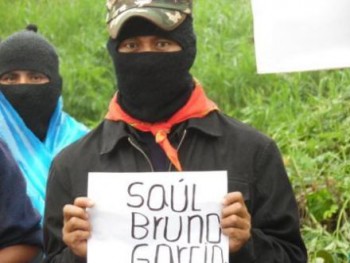


Fotografìa: Heriberto Paredes (Marcha del 26 de septiembre 2015)
En septiembre del 2015, los padres de los Normalistas desaparecidos de Ayotzinapa, ex-presos políticos, el Frente en Defensa del Agua, el Aire y la Tierra Morelos-Puebla-Tlaxcala, Sergio Rodríguez Lazcano y Gustavo Esteva integran la muestra sonora de esas nuestras voces que alimentan nuestra huella y nuestras luchas por la Autonomía:
[podcast]https://radiozapatista.org/Audios/parce/piedras0915.mp3[/podcast]!Vivos los queremos! (5 ’44 min.)
Falta lo que falta y viene lo que viene. Allá vamos.

Special program by our compañerxs from Latitudes Latinas, Brazil, one year after the terror of Ayotzinapa.
Part 1: [podcast]https://radiozapatista.org/Audios/LatitudesLatinas_Ayotzi1.mp3[/podcast]
Part 2: [podcast]https://radiozapatista.org/Audios/LatitudesLatinas_Ayotzi2.mp3[/podcast]
Chiapas, México, 28 de septiembre. “Sigue y seguirá la lucha por los desaparecidos de Ayotzinapa. Padres y familiares de los desaparecidos, su dolor y rabia es nuestra”, se leyó el pasado 26 de septiembre en los diferentes territorios zapatistas de la geografía chiapaneca. “Vivos se los llevaron, vivos los queremos”, exigieron las Bases de Apoyo del Ejército Zapatista de Liberación Nacional (BAEZLN), en el sureste de México, a un año de la desaparición forzada de los estudiantes de la normal de Ayotzinapa, en Iguala Guerrero.
En el caso del Caracol zapatista de Oventik, de los Altos de Chiapas, se observaban diferentes mantas de apoyo, de cada municipio autónomo que se dio cita: “la lucha por los desaparecidos de Ayotzinapa seguirá”, afirmaban. También se podían apreciar veladoras para para cada uno de los normalistas agredidos. “Con resistencia y rebeldía exigimos justicia”, externaban en diferentes pancartas las y los rebeldes chiapanecos bajo una llovizna incesante.

“Sabe nuestro colectivo corazón, de antes y de ahora, que nuestro dolor no es lamento estéril”
“Sabe que nuestra rabia no es desahogo inútil.”
“Sabemos quienes somos lo que somos, que nuestros dolores y rabias nacen y se alimentan de mentiras e injusticias.”

Oventic, Chiapas, 26 de septiembre de 2015. Miles de Bases de Apoyo del Ejército Zapatista de Liberación Nacional (BAEZLN), se manifestaron desde temprana hora en sus diferentes territorios en la geografía chiapaneca, en solidaridad con familiares y compañeros de los 43 normalistas desaparecidos de la normal rural de Ayotzinapa en Iguala, Guerrero.
Como lo habían anunciado desde el pasado 24 de septiembre, niños, mujeres, hombres y ancianos de la zona Altos se manifestaron a lo largo de la carretera frente al caracol de Oventic “Corazón céntrico de los zapatistas delante del mundo”, con mantas, carteles, veladoras, portando los nombres de cada uno de los 43 ausentes de la normal de Ayotzinapa.
Alrededor del medio día las BAEZLN ingresaron al caracol para realizar un acto en memoria de “Ayotzinapa y todos los Ayotzinapas que hieren los calendarios y geografías de abajo”.
Bajo una llovizna constante la manifestación se realizó en el contexto de las movilizaciones a nivel nacional e internacional para exigir como desde hace un año la presentación con vida de los normalistas rurales.
Radio Pozol y Regeneración Radio.
Al pueblo de México.
A la Sexta Nacional e Internacional.
A las organizaciones sociales y colectivos.
A la comunidad universitaria.
Después del ataque que recibimos el lunes 21 de septiembre donde el grupo porril 3 de marzo destruyo parte de la cabina de radio, hirió de gravedad a varios integrantes y golpeo a mas de 50 estudiantes alrededor de la escuela hemos recibido amenazas de muerte.
Las amenazas de muerte están dirigidas hacia ciertos miembros de nuestro colectivo. Esta situación es preocupante pues esta en riesgo la vida de muchos de nosotros.
Así, observamos que los ataques porriles a los demás planteles de CCH de la UNAM, la omisión por parte de las autoridades universitarias y de las autoridades del Gobierno del Distrito Federal ante una situación de inseguridad y las amenazas de muerte que estamos recibiendo, nos muestran un escenario peligroso para los trabajos del proyecto de comunicación que hoy a 16 años es Regeneración Radio.
Regeneración Radio
Comunicación contra el poder
A year after the murder and forced disappearance of the students from Ayotzinapa, we share this documentary produced by our compañerxs Elpida Nikou and Rodrigo Hernández about the importance of rural education in Mexico. For the students from Ayotzinapa. For all those who struggle for people’s freedom.
En conferencia de prensa desde el zócalo de la capital en donde los padres de familia de los 43 Normalistas desaparecidos se mantienen en ayuno, el abogado Vidulfo Rosales y los mismos padres, informan sobre la reunión que sostuvieron con Peña Nieto.
Vidulfo Rosales afirmó: <<Consideramos que no se dio cumplimiento a los puntos planteados…hubo un maltrato hacia los padres…>>
Mario César González, padre de uno de los 43, comenta que <<el Estado nunca les ha dado nada, más que golpes… creímos que la procuradora, por ser mujer, sería más sensible con las madres, sin embargo… hay mujeres que no tienen corazón…>>.
Checar audio conferencia.
[podcast]https://radiozapatista.org/Audios/ehecatl/conferencia de prensa de padres de ayotzinapa 24 sept 2015.mp3[/podcast]